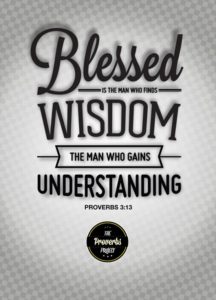PROVERBS: What is True, Divine Wisdom? Worldly Wisdom is Often Confused with the Divine Kind (Part 1)

“The fear of the LORD is the beginning of knowledge; fools despise wisdom and instruction” – Prov 1:7
Job, Proverbs, and Ecclesiastes are the three specific books which round out the topic of wisdom in the OT. Today, we will specifically look at the part Proverbs plays in the trilogy.
Proverbs is not the end-all in comprehending wisdom. Sound principles can be gleaned and be useful, even for an unbeliever from a proverb. However, that type of knowledge ascertained would not be strictly godly in nature. Someone adhering to the Proverbs alone would not be a good indicator of Godly orientation, as their righteous acts could possibly be like filthy rags to God (Isa 64:6). Human-driven good behavior cannot substitute for Spirit-driven obedience, although sometimes it can get mighty tricky telling them apart.
Proverbs can be likened to a training manual for life; it imparts wisdom on how to live, and how to distinguish right from wrong. It assumes an ordered world (which at times we are not in, and why Proverbs cannot standalone in defining wisdom – see Job). Proverbs gives the best advice from a worldly perspective, generally yielding the best results. Even more than this, the book defines precisely and consistently, along with all other biblical wisdom literature, what the fear of the Lord entails.
The fear of the Lord is what is mandatory to possess and sustain Godly wisdom and have a right relationship with Him. It consists of a person taking refuge in and giving tribute to God‘s Son (Psa 2) and an active obeying of God‘s Word – only possible due to their faith. If done, that person is enabled to possess and be filled with divine wisdom and understanding (1 Cor 2:6-16).
Worldly wisdom versus the Godly variety must be distinguished. Otherwise, people can be pretending to be a true child of God (sometimes even unknowingly), but in fact, they’re only partaking in a charade that results in eternal separation from Him (Matt 7:21-23). Again, this distinction is very, very important to make to ensure a right relationship with the Lord.
To be continued…